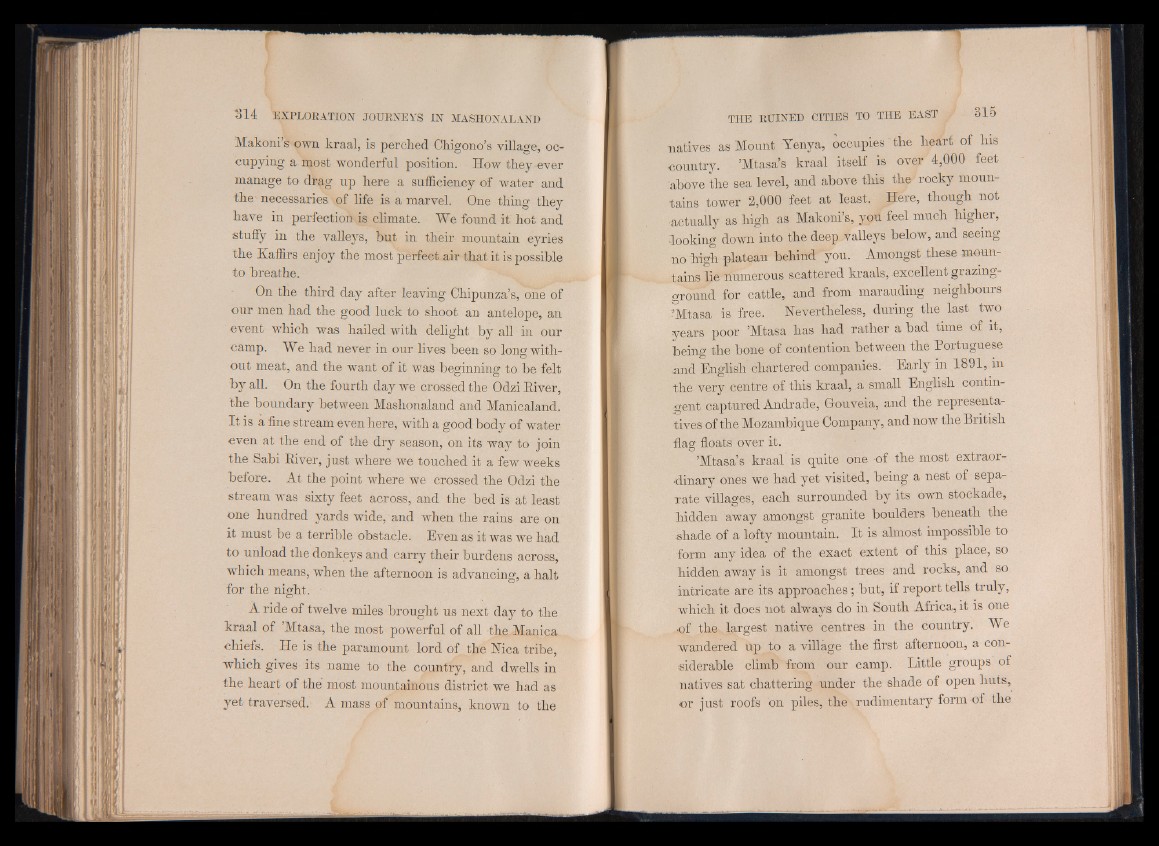
Makoni’s own kraal, is perched Chigono’s village, occupying
a most wonderful position. How they-ever
manage to drag up here a sufficiency of water and
the necessaries of life is a marvel. One thing they
have in perfection is climate. We found it hot and
stuffy in the valleys, but in their mountain eyries
the Kaffirs enjoy the most perfect air that it is possible
to breathe.
On the third day after leaving Chipunza’s, one of
our men had the good luck to shoot an antelope, an
event which was hailed with delight by all in our
camp. We had never in our lives been so long without
meat, and the want of it was beginning to be felt
by all. On the fourth day we crossed the Odzi Kiver,
the boundary between Mashonaland and Manicaland.
It is a fine stream even here, with a good body of water
even at the end of the dry season, on its way to join
the Sabi River, just where we touched it a few weeks
before. At the point where we crossed the Odzi the
stream was sixty feet across, and the bed is at least
one hundred yards wide, and when the rains are on
it must be a terrible obstacle. Even as it was we had
to unload the donkeys and carry their burdens across,
which means, when the afternoon is advancing, a halt
for the niOoht.
A ride of twelve miles brought us next day to the
kraal of ’Mtasa, the most powerful of all the Manica
chiefs. He is the paramount lord of the Nica tribe,
■which gives its name to the country, and dwells in
the heart of the most mountainous district we had as
yet traversed. A mass of mountains, known to the
natives as Mount Yenya, occupies‘the heart of his
country. ’Mtasa’s kraal itself is over 4,000 feet
'above the sea level, and above this the rocky mountains
tower 2,000 feet at least. Here, though not
actually as high as Makoni’s, you feel much higher,
looking down into the deep valleys below, and seeing
no high plateau behind you. Amongst these mountains
lie numerous scattered kraals, excellent grazing-
ground for cattle, and from marauding neighbours
-’Mtasa is free. Nevertheless, during the last two
years poor ’Mtasa has had rather a bad time of it,
being the bone of contention between the Portuguese
and English chartered companies. Early in 1891, in
the very centre of this kraal, a small English contingent
captured Andrade, Grouveia, and the representatives
of the Mozambique Company, and now the British
fiag floats over it.
’Mtasa’s kraal is quite one -of the most extraordinary
ones we had yet visited, being a nest of separate
villages, each surrounded by its own stockade,
hidden away amongst granite boulders beneath the
«hade of a lofty mountain. It is almost impossible to
form any idea of the exact extent of this place, so
hidden away is it amongst trees and rocks, and so
intricate are its approaches ; but, if report tells truly,
which it does not always do in South Africa, it is one
•of the largest native centres in the country. We
wandered up to a village the first afternoon, a con-
«iderable climb from our camp. Little groups of
natives sat chattering under the shade of open huts,
or just roofs on piles, the rudimentary form of the